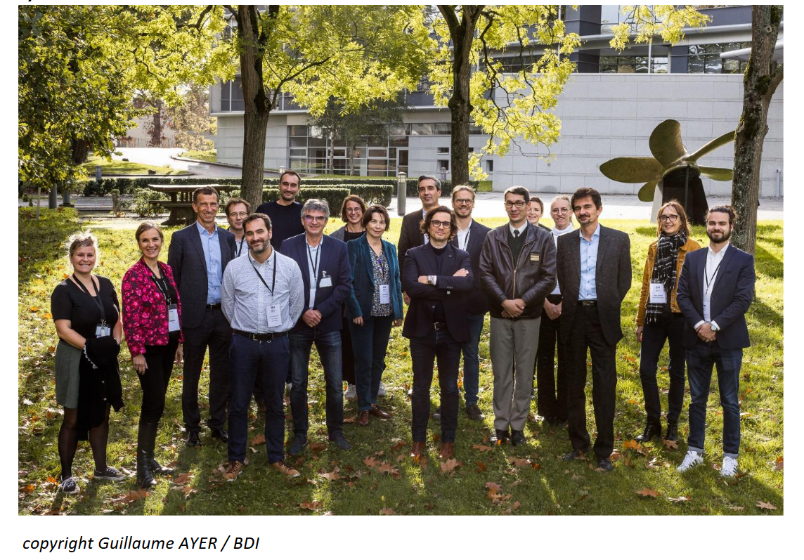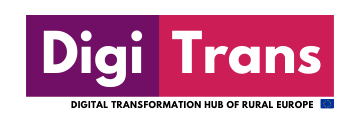Digitalization of European Regions – A European and Regional co-built digitalization instrument: EDIH

How can we not talk about a recent major initiative from the EU Commission: The European Digital Innovation Hubs?
From a European ambition …
The idea of having a European network of regional digital innovation hubs is not new. For many years now, there have been discussions on the need of having a coherent digital strategy at the EU level, to face global changes, stay competitive, sovereign, and mastering the transition of our European economy and systems. Especially, an improvement on cybersecurity and IA competences were targeted.
The idea of “European digital innovation hubs” (EDIH) emerged, as a way to gather in a one-stop-shop, regional digital competencies, skills, experts to support companies and public sector in their digital transition. Ideally, there would be one per European regions, around 200 in total.
For 2 years, models have been presented, common criteria have been discussed to determine what would be a European Digital Innovation Hub. Although it was easy to point out the need for better, clearer support services (training, test before invest, support to find investment, project generation), the concrete mechanism to achieve it wasn’t clear at all.
The major struggle was the diversity of regions in terms of political organization, subsidiarity principle, economic sectors, public support level. It was clear that were no one-fit-all solution, and regions will have to play a major role in the definition of their EDIH. This was also a main finding of our Digitranshub digital pioneer analysis and smart region profile definition.
… To regional implementations
Regions have been consulted and it turns out to increasingly become territorial projects, backed, and funded by the EU of course, but also by the regions, equally. It has been decided in 2021 that a European expression of interest will be launched, with a preselection by the national level of regional EDIH projects, to ensure the most coherent implementation with all the different level of governance. Then, a call for tender has been launched where EDIH projects were able to demonstrate their feasibility, their readiness, and their connectedness with regional, national, and European initiatives, in a “smart” approach.
Although a diversity of projects emerged, they all have the same backbone: a regional (moral and financial) support and common services categories. The idea was to use the existing regional competencies, as strategic advantages. It turns out that with such an approach, it will better adapt to existing regional ecosystems and better address the needs of companies and public sector, has a European tool dedicated to regional challenges. This is also one of the digitalization factors of success we pointed in our Digitranshub digitalization initiatives analysis and smart region profile definition.
After several months of evaluation, around a hundred projects have been selected for the 1st call and implementations started at the end of 2022.

The EDIH Bretagne case
In Bretagne, regional government positioned very early on this initiative and a task force gathering a dozen of partners from the regional innovation ecosystem has been dedicating to build the Breton answer to the call. The project has been granted and started officially in November 2022.
The first services will be operational in March 2023, to address collectively and individually around half a thousand companies and public sector organizations. EDIH Bretagne focuses on cybersecurity, as it is well renown in France and Europe, for its strong ecosystem, major companies, and strong links of the Defence Ministry. It aims at boosting cybersecurity innovation and empowering companies from its strategic sectors: maritime economy, agrifood industry, health, and digital sector.
Gathering 9 partners delivering services, it also relies on the regional council and many sectorial cluster organizations, to widely cover the regional stakeholders and ensure a certain geographical equality. Through a single contact point, a client journey will be provided, with a diagnosis, a transformation plan and more than 70 services addressing a great variety of needs. A close follow up will be made by a unique referent, locally based to ensure reactivity and knowledge of the local needs and challenges.
An opportunity for Digitranshub project
EDIH will be a major instrument for the digitalization of the region and will allows to develop rural areas with new applications, new digital solutions to foster circular economy, smart grids, better connect new and renewable energies, agrifood and health systems.
Although the implementation is regional, the European dimension is rooted in the EDIH. A strong network has been created around cybersecurity competencies, with other EDIH, to share the expertise at the EU level, through common events, study visits, and market opportunities for companies. Bretagne region will also benefit from the expertise of other EDIH, as a pool of solutions and good practices for its development.
It is for Digitranshub an interesting partnership to look at, as cooperation between EDIH is key, joint activities could be organized with our future digitranshub to focus especially on the digitalization of rural areas, perhaps with dedicated hackatons in rural regions with the same challenges?
Meet the EDIH Bretagne team at FIC 2023 event, 5,6 and 7 of April in Lille, France to discuss collaborations and follow them to learn from their experience!
Recent Posts
Digitrans Hub Blog
Do you want to share your story with us?
If you want to be part of our project, click the button and fill-in the contact form to share your story with us!
Join usFunded by the European Union. Views and opinions expressed are however those of the author(s) only and do not necessarily reflect those of the European Union or the European Education and Culture Executive Agency (EACEA). Neither the European Union nor EACEA can be held responsible for them.
ERASMUS+ DISCLAIMER
LICENSED UNDER CREATIVE COMMONS

This work is licensed under a Creative Commons Attribution – NonCommercial – Sharealike 4.0 International License.

Funded by the European Union. Views and opinions expressed are however those of the author(s) only and do not necessarily reflect those of the European Union or the European Education and Culture Executive Agency (EACEA). Neither the European Union nor EACEA can be held responsible for them.
ERASMUS+ DISCLAIMER
LICENSED UNDER CREATIVE COMMONS

This work is licensed under a Creative Commons Attribution – NonCommercial – Sharealike 4.0 International License.





